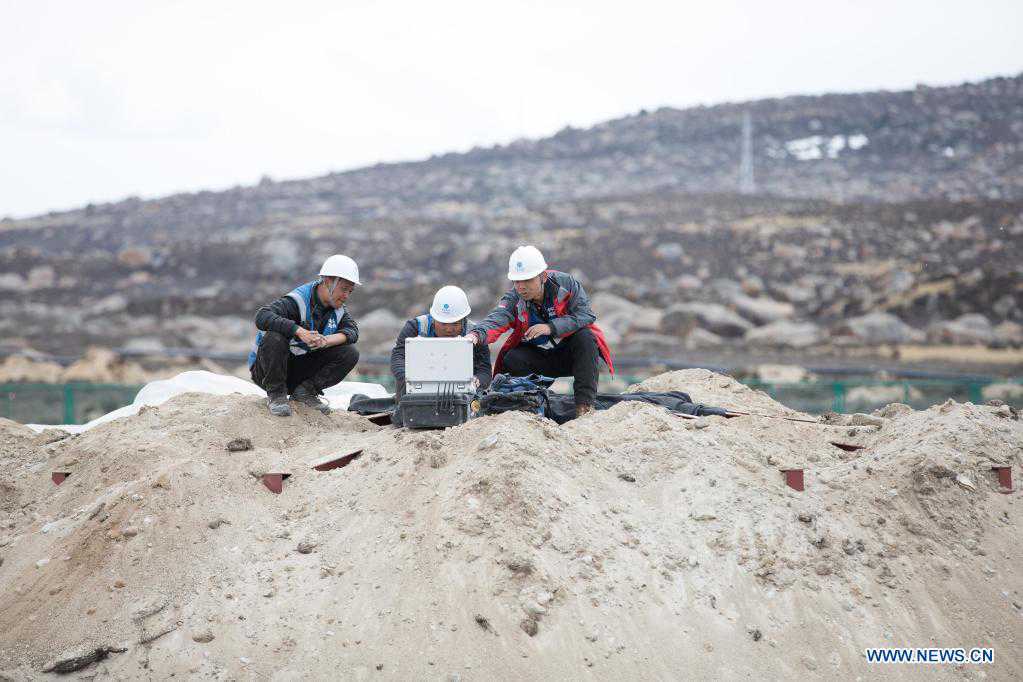Chinese scientists discover ultra-high-energy Milky Way cosmic accelerators
File photo shows researchers of China's Large High Altitude Air Shower Observatory (LHAASO) He Huihai (R), Xin Guangguang (C) and Yuan Xiangfei talking about scientific data, on April 28, 2019. Chinese scientists have detected a dozen ultra-high-energy (UHE) cosmic accelerators within the Milky Way, a find that could overturn humanity's understanding of the galaxy and help reveal the origin of cosmic rays, which have puzzled scientists for a century. The findings were based on the observations of China's Large High Altitude Air Shower Observatory (LHAASO), one of the country's key national science and technology infrastructure facilities, which is under construction in Daocheng, in southwest China's Sichuan Province. The new discoveries were published in Nature on Monday. Scientists have also detected photons with energies exceeding 1 peta-electron volt (quadrillion electron-volts or PeV), 100 times more energy than the record high achieved by any manmade accelerator on Earth. One photon with an energy of 1.4 PeV was detected, the highest value ever observed by humans. (Xinhua/Jin Liwang)
BEIJING, May 17 (Xinhua) -- Chinese scientists have detected a dozen ultra-high-energy (UHE) cosmic accelerators within the Milky Way, a find that could overturn humanity's understanding of the galaxy. It could help reveal the origin of cosmic rays, which have puzzled scientists for a century.
The findings were based on the observations of China's Large High Altitude Air Shower Observatory (LHAASO), one of the country's key national science and technology infrastructure facilities, which is under construction in Daocheng in southwest China's Sichuan Province.
These discoveries were published in the journal Nature on Monday.
Scientists led by the Institute of High Energy Physics under the Chinese Academy of Sciences made the discoveries after an 11-month observation period using the completed half of the installation.
Scientists have also detected photons with energies exceeding 1 Peta-electron volt (quadrillion electron-volts or PeV), 100 times more than the record high achieved by any manmade accelerator on Earth. One photon with an energy of 1.4 PeV was detected, the highest value ever observed by humans.
"These findings overturn our traditional understanding of the Milky Way and open up an era of UHE gamma astronomy. These observations will prompt us to rethink the mechanism by which high-energy particles are generated and propagated in the Milky Way," said Cao Zhen, chief scientist of LHAASO.
"In addition, these observations will encourage us to explore more deeply violent celestial phenomena and their physical processes, as well as to test basic physical laws under extreme conditions," Cao said.
Through UHE gamma astronomy, the century-old mystery of the origin of cosmic rays may soon be solved, Cao added.
"These findings bring us closer to understanding the origins of extremely high-energy cosmic rays," said Karl Ziemelis, chief physical sciences editor for Nature.
LHAASO has revealed many PeV cosmic acceleration sources in the Milky Way, all of which are candidates for being UHE cosmic ray generators. It is a crucial step toward determining the origin of cosmic rays, according to Chen Songzhan, the physics coordinator of LHAASO Collaboration.
Photons with energies exceeding 1 PeV were detected in a very active star-forming region in the constellation Cygnus, the research team said.
The star-forming area in the direction of Cygnus is the brightest region in the northern territory of the Milky Way, with many massive star clusters. Massive stars only exist for about one million years, so the clusters contain enormous stars in the process of birth and death, with a complex, strong-shock environment. They are ideal "particle astrophysics laboratories," or places for accelerating cosmic rays, the researchers said.
 |
Photos
Related Stories
Copyright © 2021 People's Daily Online. All Rights Reserved.











